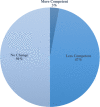Impact of the COVID-19 pandemic on interventional cardiology training in the United States
- PMID: 32767717
- PMCID: PMC7436398
- DOI: 10.1002/ccd.29198
Impact of the COVID-19 pandemic on interventional cardiology training in the United States
Abstract
Objectives: We sought to determine the effect of COVID-19 related reduction in elective cardiac procedures and acute coronary syndrome presentations on interventional cardiology (IC) training.
Background: The COVID-19 pandemic has significantly disrupted healthcare in the United States, including cardiovascular services. The impact of COVID-19 on IC fellow training in the United States has not been assessed.
Methods: The Society for Cardiovascular Angiography and Interventions (SCAI) surveyed IC fellows training in both accredited and advanced non-accredited programs, as well as their program directors (PD).
Results: Responses were received from 135 IC fellows and 152 PD. All respondents noted reductions in procedural volumes beginning in March 2020. At that time, only 43% of IC fellows had performed >250 PCI. If restrictions were lifted by May 15, 2020 78% of IC fellows believed they would perform >250 PCI, but fell to only 70% if restrictions persisted until the end of the academic year. 49% of IC fellows felt that their procedural competency was impaired by COVID-19, while 97% of PD believed that IC fellows would be procedurally competent at the end of their training. Most IC fellows (65%) noted increased stress at work and at home, and many felt that job searches and/or existing offers were adversely affected by the pandemic.
Conclusion: The COVID-19 pandemic has substantially affected IC training in the United States, with many fellows at risk of not satisfying current program procedural requirements. These observations support a move to review current IC program requirements and develop mitigation strategies to supplement gaps in education related to reduced procedural volume.
Keywords: competency; coronavirus; interventional cardiology; medical education; procedure volume; training.
© 2020 Wiley Periodicals LLC.
Conflict of interest statement
Dr Szerlip is a consultant and speaker for Edwards Life Sciences, Medtronic, Abbott, and Boston Scientific. Dr Mahmud reports clinical research support from Cardiovascular Systems Inc., Corindus, and Abbott Vascular, and is a consultant for Medtronic and Abiomed. None of the remaining authors have anything to disclose.
Figures





Comment in
-
Overcoming obstacles in interventional cardiology training during the COVID-19 pandemic.Catheter Cardiovasc Interv. 2020 Nov;96(5):1006-1007. doi: 10.1002/ccd.29340. Catheter Cardiovasc Interv. 2020. PMID: 33156960 No abstract available.
References
-
- Centers for Medicare & Medicaid Services . CMS Adult Elective Surgery and Procedures Recommendations: Limit all non‐essential planned surgeries and procedures, including dental, until further notice. https://www.cms.gov/newsroom/press‐releases/cms‐releases‐recommendations.... Accessed March 18, 2020.
-
- Rajagopalan B et al. State of structural and congenital heart disease interventional training in United States and Canada: an Assessment by the American College of Cardiology Fellows‐in‐Training Section Leadership Council . JACC Cardiovasc Interv. 2016;9(17):1854‐1856. - PubMed
MeSH terms
Grants and funding
LinkOut - more resources
Full Text Sources
Miscellaneous

